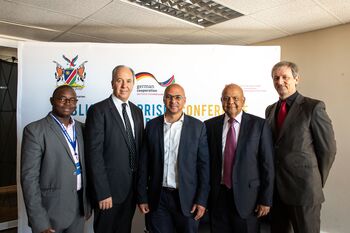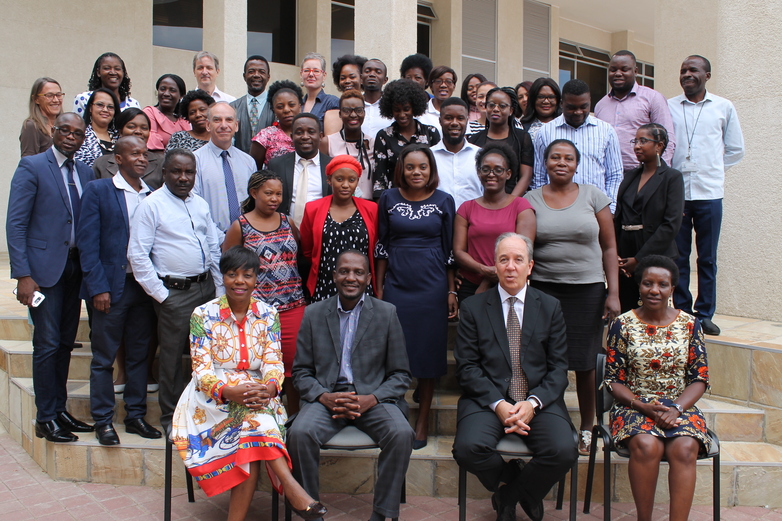Monitoring and improving the performance of public enterprises in Namibia
Project description
Title: Performance Monitoring of Public Enterprises (PMPE)
Commissioned by: German Federal Ministry for Economic Cooperation and Development (BMZ)
Country: Namibia
Lead executing agency: Ministry of Public Enterprises (MPE)
Overall term: 2019 to 2021

Context
According to the World Bank, more than two thirds of Namibians have to get by on less than 5.50 US dollars a day, and nearly half survive on less than 3.20 US dollars a day. Given that Namibia’s government spending policy, which is geared towards reducing poverty, has to compete directly with the subsidy requirements of loss-making public enterprises (PE), there is a need for reforms dedicated to reducing the level of subsidisation that flows to PEs. Such savings can then indirectly benefit poorer population groups.
PEs exist as a channel through which government can achieve the highest level of service delivery in a cost-effective manner. The decision to commercialise some of Namibia’s government departments was taken to improve the delivery of services, reduce expenditure and generate income (through dividends). The aim of these measures is to improve the government’s financial situation and ultimately spur economic growth. To date, however, most PEs have been running deficits, making them dependent on government bailouts, which in turn depletes state coffers. The Ministry of Public Enterprises (MPE) was founded in 2015 and mandated with positioning key public enterprises to play a meaningful role in the country´s development agenda. It is also commissioned with ensuring good governance with the aim of reducing the financial burden on the state.
To improve governance and eliminate shortcomings in the governance model used at that time, in 2016 the MPE also implemented Namibia’s Hybrid Governance Model, which divides public enterprises into three categories: (1) commercial public enterprises; (2) non-commercial public enterprises; and (3) extra-budgetary funds/financial institutions.
Objective
Namibia is improving the performance and economic viability of its public services.
Approach
Working with the Ministry of Public Enterprises, the project will ultimately reach 22 commercial public enterprises once the piloting phase is completed. Many of these enterprises act as an intermediary for two indirect target groups: (1) the Namibian private sector and (2) the national population. Companies and the general public rely on the supplies and services that various PEs provide (e.g., water, electricity, telecommunications, transport), meaning that both are directly affected by their availability, affordability and quality.
The aim is to reduce state funding spent on bailing out inefficient and poorly managed PEs, so that more funds will become available for spending on development measures like health, education and poverty eradication.
The project focuses on three main fields of activity:
The first aims to support the MPE in developing and implementing improved basic governance conditions based on the 2019 Public Enterprises Governance Act (PEGA). Line ministries will transfer responsibility and ownership rights for CPEs to the MPE.
The second strives to develop a performance management system to better monitor CPE performance. This system will provide the information and relevant functions for monitoring and overseeing public enterprises. It is to be piloted in five selected enterprises in order to check its expediency, user friendliness and to adapt it where necessary.
The third is designed to improve the ability of relevant actors to make consistent and full use of the performance management system. Using the information this system provides, the actors will be empowered to improve the governance of PEs. A central criterion here is that the Ministry of Public Enterprises has enough staff, financial and management resources to effectively implement the performance monitoring information system.
Results
- The first National Public Enterprises Conference was held in September 2019 and attended by 200 delegates consisting of Board Chairpersons, CEOs and international guests (including Public Enterprises Minister Pravin Gordhan from South Africa).
- The Namibian State’s Ownership Policy for Public Enterprises was drafted, presented to and shared with the Ministry of Public Enterprises. The policy draft serves as a high-level document for the MPE, and other relevant ministries, to ensure that the State exercises PEs ownership professionally, actively and effectively. The Policy is now undergoing the relevant political and legislative approval processes.
Last update: March 2021
